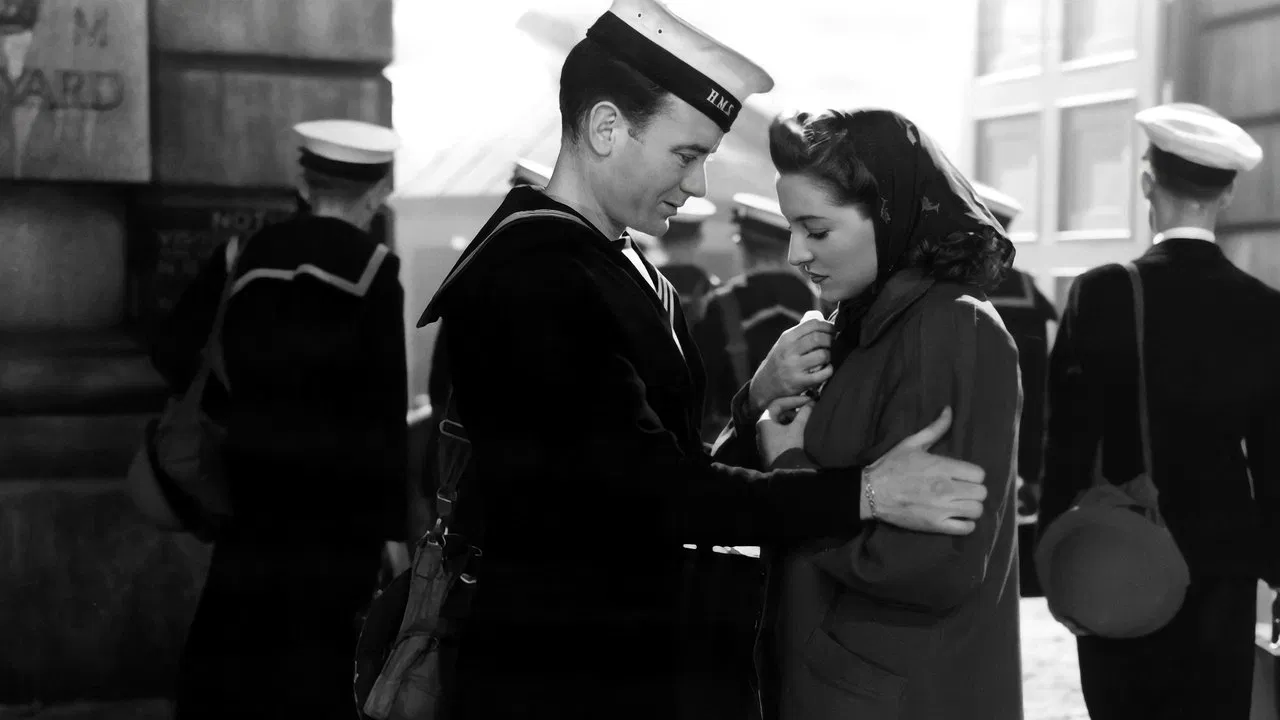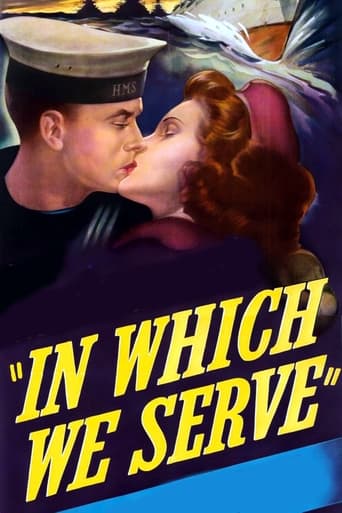

Wow! Such a good movie.
... View MorePretty Good
... View Morenot horrible nor great
... View MoreOne of the best movies of the year! Incredible from the beginning to the end.
... View MoreA Two Cities Film. A Noel Coward Production. Presented and released in the U.K. through United Artists. New York opening at the Capitol: 23 December 1942. U.S. release: 12 February 1943. Australian release through G-B-D: 24 June 1943. 12 reels. 10,496 feet. 116½ minutes.SYNOPSIS: "This is the story of a ship." A brief, documentary ship-building sequence is followed by an introduction to the crew, principally represented by the Captain, the Chief Petty Officer and an Able Seaman.NOTES: Nominated for the following Academy Awards: Best Picture (dipped out to Casablanca); Best Original Screenplay (lost to Norman Krasna's Princess O'Rourke, would you believe?). However Noel Coward was voted a Special Award "for his outstanding production achievement".In Which We Serve was selected by both the New York Film Critics and the National Board of Review as the Best Picture of 1942.COMMENT: In Which We Serve may seem dated and old-hat to those young enough to have no recollection of World War 2, but to we who survived, it remains a memorable experience. The plot is cleverly constructed and comes across with all its original impact thanks to the skilled playing of a most credible group of actors. Coward himself never gave a more forceful performance, and he is ably supported by Mills and Miles. The interwoven stories of these characters and their families are the principal concern of In Which We Serve, but the film is laid against such a broadly inspiring canvas that a whole host of lesser if equally realistic portraits are tellingly brought to life by players like Richard Attenborough (a deserter), James Donald (a disillusioned doctor) and Michael Wilding (who can be glimpsed now and again exchanging his usual pleasantries with the skipper).Their women, headed by Celia Johnson, are as remote from the synthetic glamour of Hollywood as newspaper headlines from the world of Mills & Boon. Who could forget determined Joyce Carey, complaining Dora Gregory and fidgeting Kay Walsh in the air raid scene?It is easy to appropriate the direction between Coward and Lean. No doubt both men were equally supportive: Coward concentrating on the players, while Lean handled camera placement and compositions. Lean occasionally uses an opportunity to show off his skill as a former editor with some fast cutting, but generally the directors try to be as unobtrusive as possible, letting the drama speak for itself. It's a story of heroism, of the irrepressible power of the human spirit, of ordinary people reacting heroically and rising above the most harrowing events. It's a story of conquest, of power, of strength, of unity. Fancy direction would lessen its effect. The camera only moves (as in the long, slow tracking shot along the line of weary faces at the wharf) when the moment positively demands it.Production values are first class. The sets loom appro¬priately large or realistically drab, peopled with hordes of scurrying extras or just two or three embattled players. The action scenes are powerful in detail, thanks to skilled special effects. And Coward's own music score provides a telling commentary (aided by the deft introduction of such popular songs as "Roll Out the Barrel" and "Good King Wenceslaus").OTHER VIEWS: A dated yarn, using a format that has been employed time and time again in similar war pictures. The plot is old-hat and the dialogue with its injunctions to "keep a stiff upper lip", its talk about "a spot of leave" and its numerous "jolly fine" shows is impossibly stilted and clichéd. What is worse, the characters are an uninteresting and inanimate lot of one-dimensional, pasteboard figures. There are few perform¬ances - Joyce Carey's is the most memorable exception - that fire the interest. Coward is his usual wooden, unemotional self and this type of underplaying - due no doubt to Coward's direction - has infected the rest of the cast; though Sir Noel has not quite succeeded in putting down the irrepressible John Mills who battles gamely to make his portrait of life in the lower ranks seem convincing. That Mills is not wholly successful in this laudable aim is not his fault (nor the fault of director Lean and photographer Neame who have conjured up some sparkling images) but Coward's. - JHR writing as George Addison.
... View MoreNoel Coward is captain of HMS Torrin, a British Navy destroyer, and he expects his crew to obey his philosophy. His ships are happy and efficient, so he likes to believe. The story is told in flashbacks as survivors cling to a dinghy after HMS Torrin is sunk.It's a propaganda film that is meant to rouse feelings of discipline and dedication to country in time of war. Everyone seems to put the ship before themselves or their loved ones. Even the sailor's wives put the ship first and understand that there is a higher purpose beyond their own personal happiness. From that perspective, it's all a bit ghastly for me, I'm afraid. I found the film dragged and also was very choppy – a bit here then another bit there. It could have had a more focused storyline.All the women are pretty awful in this. Celia Johnson who plays Coward's wife speaks in that laughably bad clipped English and seaman John Mill's mother as depicted by Kathleen Harrison (Mrs Blake) is just plain annoying. Coward's delivery is machine gunned at you so it's not always clear what he is saying. However, set against this, there is some amusing dialogue in parts. Overall, the film is too long and I'm not sure about the propaganda message of join the war effort and expect heartbreak. Err, OK, it's a no thanks from me then.
... View MoreOpportunities to see Noel Coward recite Noel Coward were necessarily inhibited by his death, but he has left among his filmed artifacts this stunning little achievement, perhaps the quietest war film, probably the most British. To be sure, it veers maudlin once or twice, and the whole production is suffused with the blood of righteousness - but not self-righteousness. This is the kind of movie that makes me want to join the Navy, I who get seasick in the bath.How does a middle-aged homosexual song-and-dance man support the war effort? By producing a bang-up answer to Wyler and Ford, a vivid recruitment poster for the side of decency and respect. Brutal, tender, horrible, and full of hope, IN WHICH WE SERVE sings the victory song of both shellfire and home fire without mention of glory or distinction. Noel Coward's acting is a marvel of disinterested conviction. Nobody could speak faster, or with more precision, and that with the stiffest of upper lips.No one wrote dialog at once so arch and comfortable, either, except maybe Kipling. Coward celebrates the most sophisticated level of civilization, the blithe, eloquent man of society who has managed not to become jaded. He embraces his England with a respectfully familiar pinch on the cheek, and he kisses her with the most restrained of passions in front of the children. But he also loves with all his heart the simple proletarian bedrock, and he allows the working classes to display as much humanity and emotion as he denies his own character.There is much stage-like, not to say stagey, in the production, which shouldn't be very surprising given its principal antecedents. The film is sometimes expressionistic in design, the angles and sets a terrifying collage of unsettling, theatrical images in contrast to the reassuring tea cozy and the ramrod-straight captain on the quarterdeck. The symbols are profoundly simple and the effect is disarmingly true. As Coward says over a drink, "Perfect; it's not a bit too sweet." Well, it is rather, but mix another pitcher of Bovril and sherry and don't complain, there's a good chap.
... View MoreDirected by David Lean (The Bride on the River Kwai) and Noel Coward (also starring), both making their directorial debuts, this is quite a good British war film. It is a film that combines war ship battles and character flashbacks. Basically the British destroyer ship, HMS Torrin is attacked by the Nazis, and is sinking slowly, and as the surviving members of the British ship cling to a life raft, they have flashbacks both of the (familiy) live they have left behind, and their work in the army and on the ship before the attack. Starring Coward as Capt. Edward V. Kinross, Sir John Mills as Ordinary Seaman Shorty Blake, The Man Who Knew Too Much's Bernard Miles as CPO Walter Hardy, Brief Encounter's Celia Johnson as Alix Kinross, Kay Walsh as Freda Lewis, Joyce Carey as Katherine Lemmon Hardy; Derek Elphinstone as First Lieutenant, the 'Torrin' (Number One); Michael Wilding as 'Flags', Second Lieutenant; Robert Sansom as 'Guns', Gunnery Officer; Philip Friend as 'Torps', Torpedo Officer, Ballard Berkeley as Engineer Commander, James Donald as Ship's doctor, Michael Whittaker as Sub and Lord Sir Richard Attenborough (in his film debut) as Snotty, Midshipman Who Leaves Post. It was nominated the Oscars for Best Picture and Best Writing, Original Screenplay, with a special Honorary Award for Coward. Sir John Mills was number 38 on The 50 Greatest British Actors, and the film was number 57 on The 100 Greatest War Films. Very good!
... View More